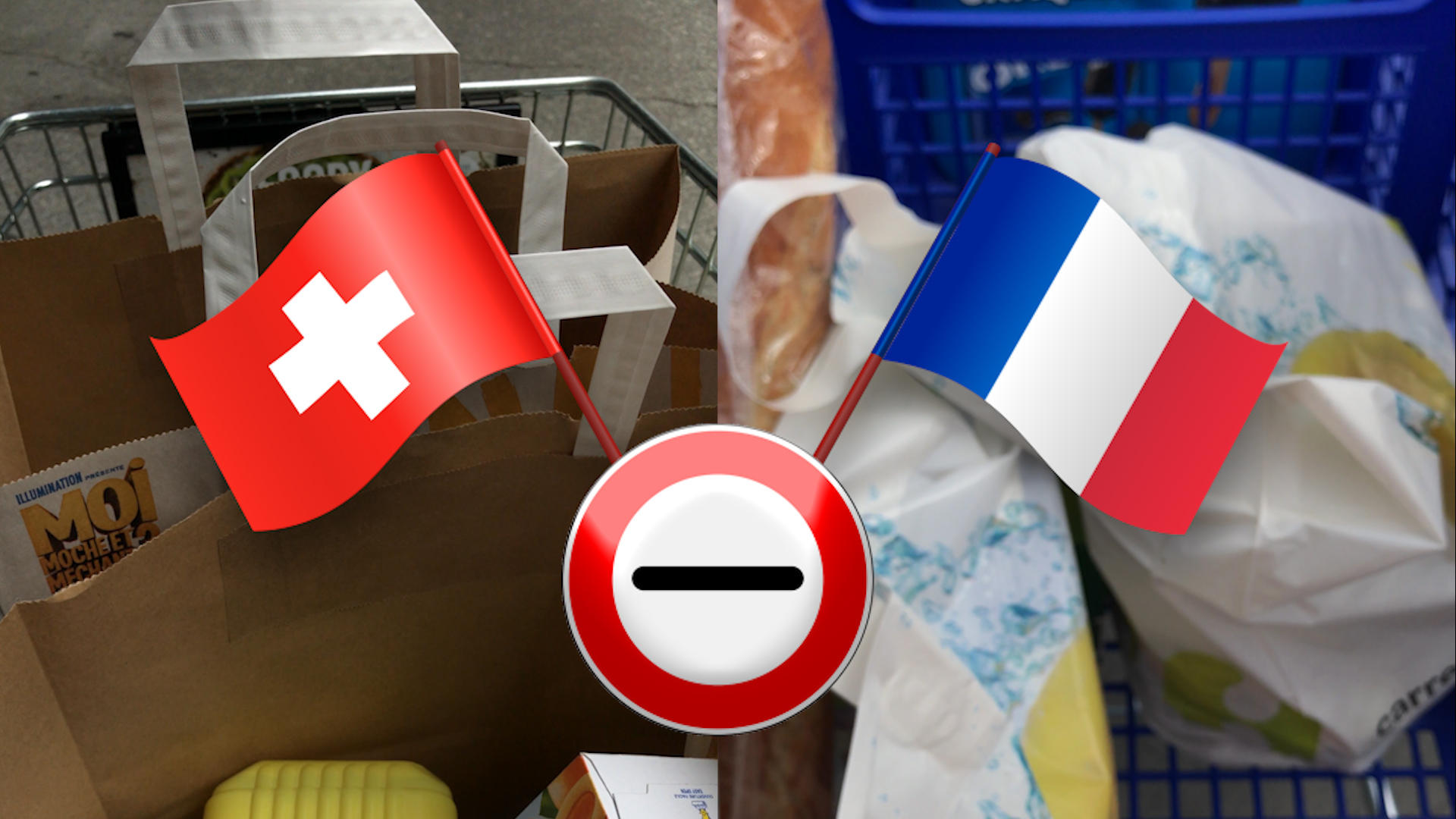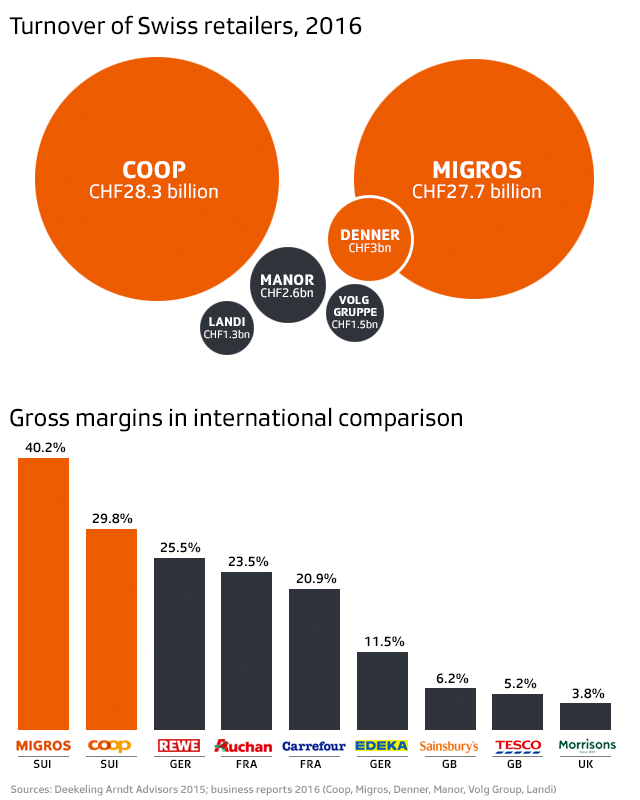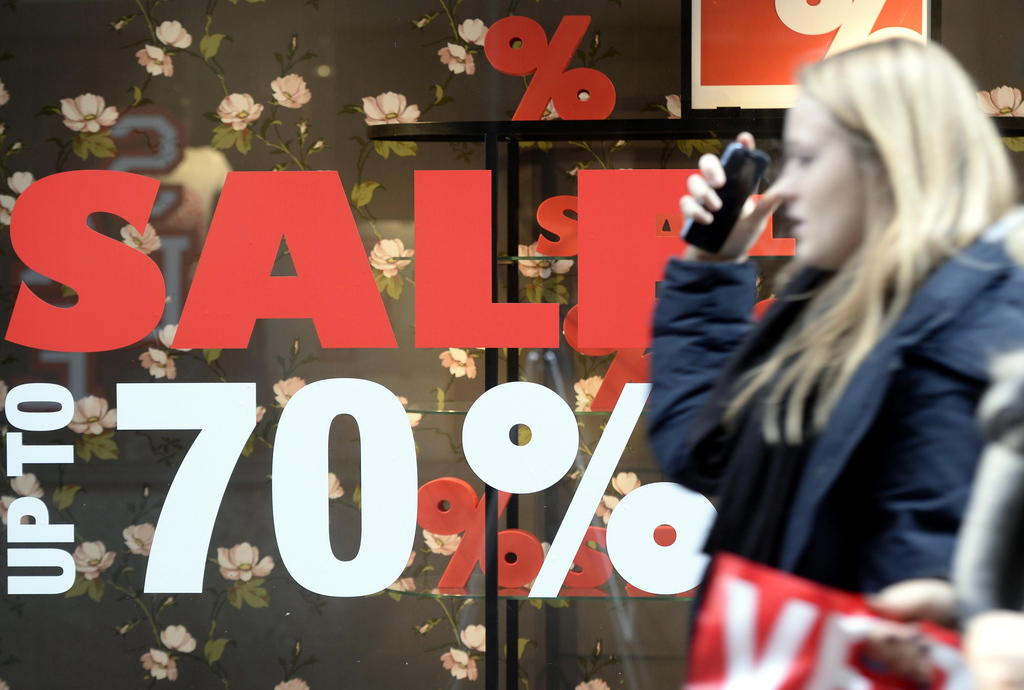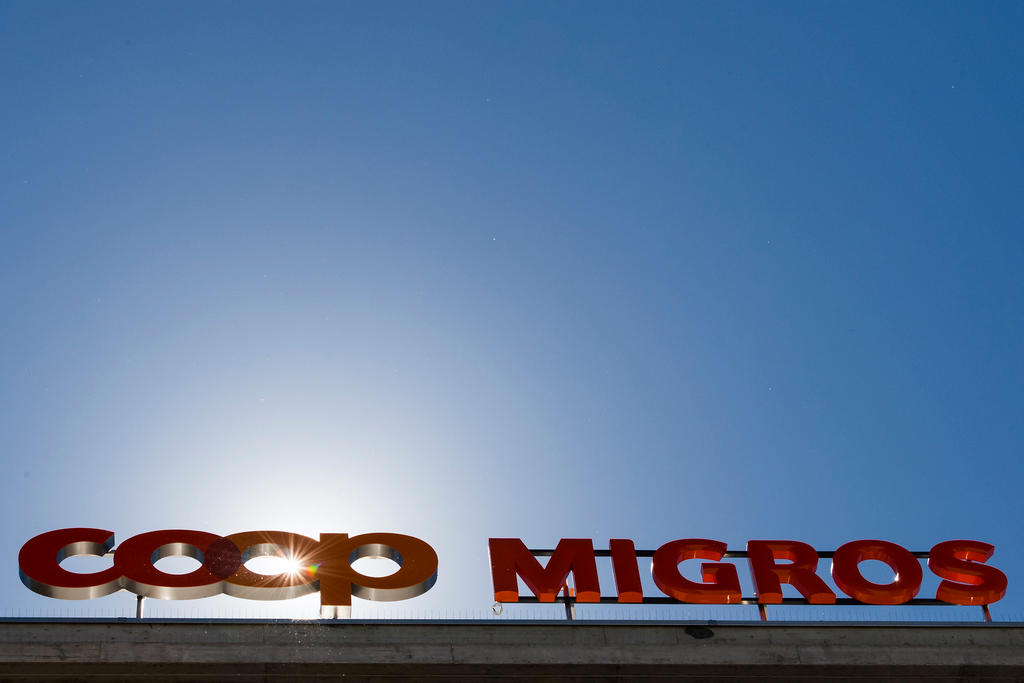What to do about Switzerland’s eye-watering prices?
Switzerland remains in a price league of its own, driving a continual flow of thrifty shoppers over its borders. Concerned by sky-high prices and impact of cross-border shopping, politicians and consumer groups are demanding action.

More
Switzerland vs France – the shopping basket price challenge
Any Swiss resident who has bought their groceries in neighbouring France, Germany, Austria or Italy is familiar with the whopping price differences compared to Swiss supermarkets, as illustrated in the short video above.
New Eurostat figuresExternal link confirm these disparities. Consumer prices in Switzerland, ranked the most expensive European country overall ahead of Iceland and Norway, are 61% higher than the EU average.
For the second year in a row, Switzerland is the most expensive in Europe for food and non-alcoholic drinks (+73% more than the EU average). But it’s also Europe’s price leader for hotels and restaurants (+67%) and clothing (+43%). Personal transport (+3%) and consumer electronics (-3%) and furniture (-3%) are closer to the EU average.
Nipping over the border for bargains is nothing new for high-earning Swiss, and relatively easy – in Geneva it is a 20-minute bus ride to the nearest French supermarket. But in January 2015, when the Swiss franc shot up against the euro following the Swiss National Bank’s decision to scrap its currency cap (CHF1.20 per euro; now CHF1.10), it made cross-border shopping that much more attractive.
Experts say the cross-border bargain-hunting frenzy probably peaked that year at an estimated value of CHF11 billion (€10 billion). Since then it has remained strong (CHF10 billion in 2016) and is predicted to stay at this level. Credit SuisseExternal link says one out of every ten Swiss francs paid for consumer items is now spent abroad.
Miguel Ferreira says he has no regrets about shopping over the border every two weeks.
“[As long as] the cost of a [shopping] basket in Switzerland can pay for a whole car [load of items] in Germany, we’ll keep on doing it,” he wrote on swissinfo.ch’s facebook page.

More
Salaries in Switzerland
Retailers under pressure
The strong franc, stubbornly high prices, and cross-border and online shopping continue to put huge pressure on Swiss businesses, especially retailers.
2017 is likely to be a third bad year in a row for the Swiss retail sector, according to a report by the GfK Institute. Last year turnover was down -1.5%, after a -2.2% fall in 2015, with sales at the lowest level since 2007.
Worried by its impact on Swiss business, a number of parliamentarians and frontier towns appear to have cross-border shoppers in their sights.
In early June, a network of border towns belonging to the Association of Swiss Communes met to discuss how to combat cross-border shopping, the Tages-Anzeiger reportedExternal link. Future meetings are planned after summer.
“There are traffic jams everywhere, shops [in Constance] are full with endless queues. That’s not the kind of shopping that Swiss consumers dream of. It’s the same every weekend, without any value for us. We can’t accept it any longer,” Andreas Netzle, mayor of Kreuzlingen, which borders the German city of Constance, told the newspaper.
The alliance of border towns, and parliamentarians like Werner Hösli of the Swiss People’s Party, believe the solution is to target Swiss customs and tax regulations. Hösli proposes reducing the CHF300 duty-free import limitExternal link to CHF50 to discourage Swiss residents from shopping abroad.
Bern is keenly following developments. The government, which says Hösli’s suggestion wouldn’t work, has been requested to report on VAT losses caused by cross-border shopping, as well as exchange rate gains on imported products that firms have not passed on.
The Senate Economics Committee has also filed a series of motions to be discussed in parliament in autumn with suggestions on how to lower high prices. These include facilitating parallel imports, simplifying product labelling, widening the EU Cassis de Dijon principle (that allows products that are lawfully produced and marketed in one EU country to be sold unrestricted in another, which was introduced in Switzerland in 2010) and revising the Swiss law on cartels.
‘Stop high-price island’
Swiss consumer groups have also got in on the act. In September 2016, they helped launch an initiative aimed at combating unfair pricing practices for imported products. The alliance hopes to force a nationwide vote if they collect enough signatures by next March.
The Federation of French-speaking Consumers (FRC)External link believes there are several reasons why Switzerland is a ‘high-price island’: little competition between Swiss retailers like Migros and Coop, and the high costs of rents, farming, advertising and logistics. But it especially blames high prices charged by suppliers of imported goods.
Migros and Coop, meanwhile, claim they are doing their utmost to tackle high prices, especially following the removal of the exchange rate cap. They say they have negotiated hard with eurozone suppliers to reduce the prices of thousands of items on their shelves and pass on exchange rate gains.

The high-price issue appears to have turned into a battle of numbers on all sides. Coop spokesperson Andrea Bergmann told swissinfo.ch it ‘consistently passes all currency advantages on to customers’, and in the past two years this has translated into CHF230 million worth of savings on 15,000 products. Migros says it has passed on the equivalent of CHF270 million. In the past, Coop and Migros have tried parallel imports of certain brands but this remains difficult and tightly controlled by foreign manufacturers and suppliers.
Both say that their high margins, which were recently reported, are not comparable with abroad and claim that higher salaries and rents are to blame. Migros adds that three-quarters of its products are own brand, which result in higher margins. A BakBasel studyExternal link presented in May claims Swiss retailers’ costs are 50% higher on average than those of competitors in neighbouring countries.
FRC retorts that high salaries earned in Switzerland are not the main factor behind the high prices, as Swiss retail workers, for example, are highly productive and their bigger salaries compared to neighbouring countries are thus compensated.
“The Swiss have a higher purchasing power so they are ready to pay more for goods and services. Manufacturers and suppliers, in particular foreign-owned, simply exploit this high purchasing power,” it concludes.

In compliance with the JTI standards
More: SWI swissinfo.ch certified by the Journalism Trust Initiative















You can find an overview of ongoing debates with our journalists here . Please join us!
If you want to start a conversation about a topic raised in this article or want to report factual errors, email us at english@swissinfo.ch.